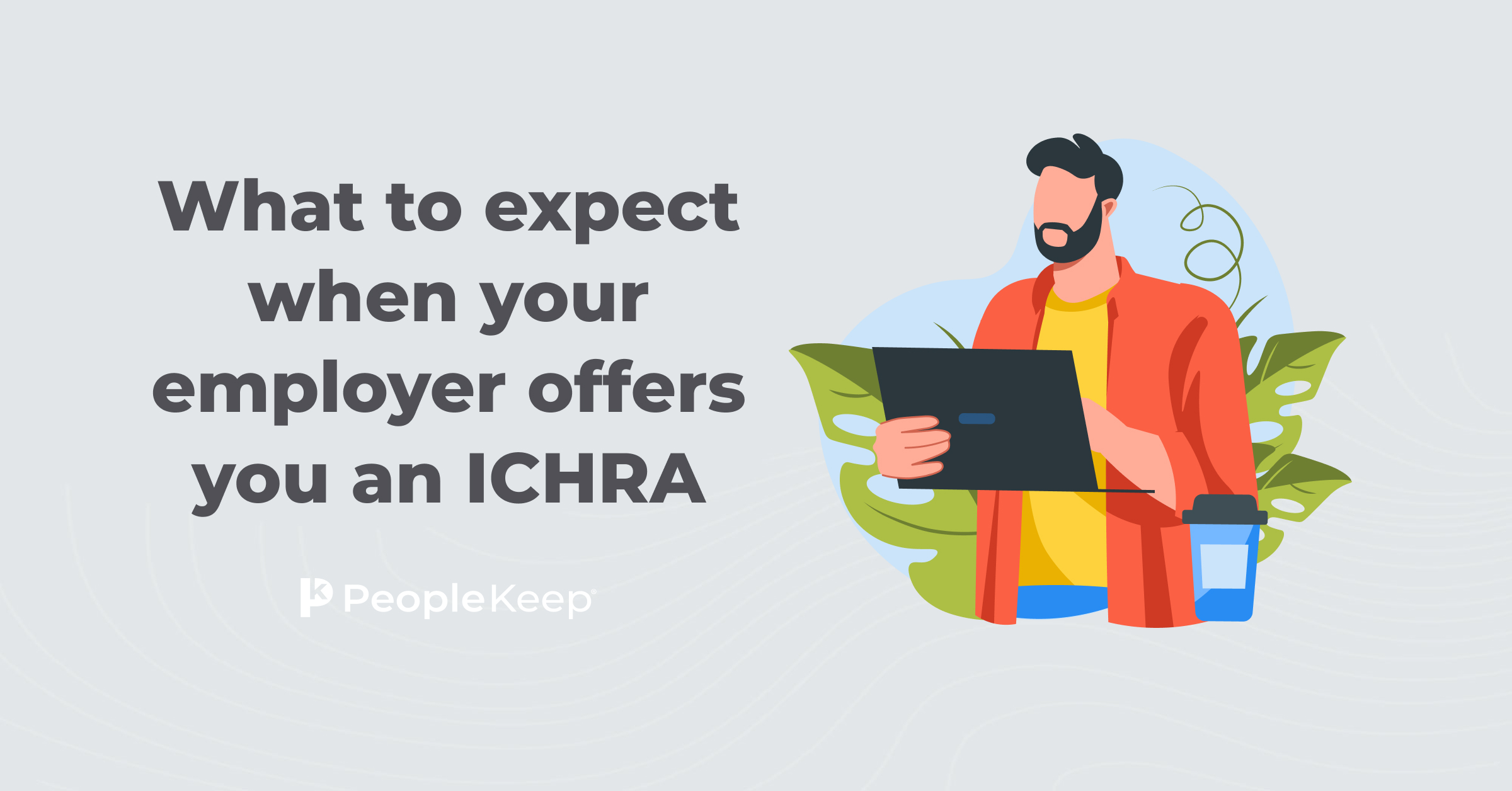What are the most important benefits to employees?
By Holly Bengfort on July 1, 2025 at 5:45 PM
In today's competitive labor market, employers are constantly looking for ways to attract and retain top talent. In many cases, offering an attractive salary alone isn't enough. PeopleKeep's 2024 Employee Benefits Survey found that 81% of employees said an employer's benefits package is an important factor in whether they accept a job.
You need an impressive employee benefits package to win over the right candidate. But with such a wide range of benefit options available, where do you start?
In this article, we'll explore the key benefits employees value most and explain how you can offer them at your organization.
In this blog post, you'll learn:
- Which employee perks support a healthy work-life balance.
- How the right employee benefits can boost improve company culture.
- How employers can provide affordable health benefits to their employees.
What are the top benefits employees want?
Employee benefits have emerged as one of the most important aspects of job satisfaction. While they may vary from company to company, certain types of employee perks consistently rank higher than others in their impact on well-being and loyalty.
Let's go over some of the most sought-after employee perks.
Health benefits
Health coverage is one of the most important benefits employers can offer their workers. Findings from our survey show that 92% of employees rated health benefits as important.
Health insurance helps protect employees from unexpected medical expenses and allows them to receive the quality medical care they need. When employers choose to offer this popular benefit, it shows their dedication to the well-being of their team.
Unfortunately, traditional group health insurance is expensive. KFF1 found that the average annual cost of employer-sponsored medical insurance premiums per employee in 2023 was $25,572 for family coverage and $8,951 for single coverage. Even if your small business or nonprofit can afford a group plan now, you'll likely face steep annual rate increases and tough minimum participation requirements.
Some businesses turn to self-funded plans to save on premiums. However, unless your organization is large, unexpected high claims volume could lead to financial hardships. Since employers cover the risk of their employees’ medical claims directly, you need to have enough capital to cover unexpected medical expenses.
Many employers utilize health reimbursement arrangements (HRAs) instead of or in addition to a group plan. They're a cost-effective way to offer health benefits. HRAs allow employers to reimburse employees tax-free for their healthcare expenses. Depending on the type of HRA you offer, qualifying out-of-pocket expenses can include medical care services and premiums, premiums for dental and vision insurance, and other related costs.
Here are the types of HRAs you can administer with PeopleKeep by Remodel Health:
- The coverage HRA (ICHRA): The ICHRA works for businesses of all sizes. With it, employers can reimburse employees for their individual health plans. Employers can provide an ICHRA as a stand-alone benefit or as an alternative for employees who are ineligible for an existing group health insurance plan. An ICHRA offers employers the ability to differ allowances and benefit eligibility with 11 employee classes, such as full-time or part-time workers. Employees must have a qualifying individual health plan to participate in the ICHRA.
- The small employer HRA (QSEHRA): The QSEHRA is a stand-alone benefit for small businesses with fewer than 50 full-time equivalent employees (FTEs) that don't offer a group plan. Like the ICHRA, it reimburses employees for their individual health plans and out-of-pocket costs. You must offer a QSEHRA to all of your W-2 full-time employees. You can also choose to offer it to part-time employees. This allows you to reimburse your employees for their individual health insurance premiums and out-of-pocket expenses. Employees must have a health insurance plan that meets or exceeds minimum essential coverage (MEC) standards to participate in the QSEHRA.
- The group coverage HRA (GCHRA): The GCHRA, also known as an integrated HRA, is beneficial for employers who want to boost their existing group health insurance plan to better recruit and retain top talent. It serves as additional coverage for out-of-pocket expenses that may not be fully covered by the group health plan, such as deductibles.
Dental insurance
Since traditional health insurance plans rarely cover adult dental care, dental insurance is another employee perk worth considering, especially since 91% of employees ranked it as important in our survey.
It's no surprise since dental care is costly. A study by Synchrony1 found that 92% of Americans have considered delaying dental care due to the rising cost of treatment. By offering your employees dental coverage, you can help them maintain a healthy smile and offer assistance with costly dental procedures.
Instead of offering a group dental plan, you can offer an HRA as an affordable option. Then, they can choose an individual dental plan. This is great for employers who want to offer medical and dental coverage to their employees without the extra cost or hassle.
Paid time off
If you want to entice job seekers, you'll catch their attention by offering ample paid time off (PTO) as an employee perk. According to our survey, 90% of employees view PTO as a highly important company perk.
Adequate vacation time, sick leave, and personal days are essential for maintaining employee morale and preventing burnout. PTO provides a greater quality of life by allowing employees to rest and recharge without the fear of losing their income.
Retirement benefits
Employees want help with their retirement planning. Employer-sponsored retirement plans, such as 401(k)s or pension plans, allow employees to save for their future and ensure their financial security after they stop working.
Our survey found that 89% of employees said retirement benefits are important to them. Yet, many employers are missing the mark here since only 61% of those surveyed offer it. Therefore, offering a retirement savings plan is another great way to improve employee loyalty, become an employer of choice, and gain a competitive edge.
Wellness and mental health benefits
Holistic health is also important to employees, with 80% rating mental health and/or wellness benefits as important.
With an HRA, you can reimburse employees for medically necessary wellness expenses, including:
- Mental health counseling
- Chiropractic care
- Acupuncture
Additionally, a fun work environment can provide mental health support. To improve the employee experience at your organization, consider:
- Hosting office happy hours
- Organizing monthly book clubs
- Planning group games and activities
Having access to an on-site gym or a discounted gym membership is another major employee perk. Not only does it provide an opportunity for exercise and stress relief, but it also helps promote a healthier lifestyle for employees by providing them with the resources they need to stay fit and healthy. Wellness programs can also improve employee productivity by reducing absenteeism.
Flexible work arrangements
With the rise of remote work, it's no surprise that many employees want more flexibility in their working arrangements. Survey results show that 57% of employees said it's important to have remote work opportunities or a hybrid work environment.
Providing remote work options, flexible work hours, or four-day workweeks can positively impact employee satisfaction by promoting work-life balance. This allows employees to effectively manage their professional and personal lives while meeting their job requirements.
Life insurance
Employees also want financial security for their loved ones, with 77% of them rating life insurance as an important employee benefit. It helps ensure that your employee's family is taken care of financially in the event of their death. It can provide financial security for family members, cover funeral expenses, pay off debts, or any other financial needs that may arise after their passing.
Life insurance is another employee benefit that can set you apart from the competition since only 48% of employers surveyed currently offer it.
Education benefits
Education costs are a financial burden for many American workers. According to Education Data3, the average federal student loan debt balance is $38,375. This alone makes education benefits another appealing perk for employees. They offer financial support for personal growth and provide opportunities for skill acquisition.
Here are some examples of education benefits you can offer:
- Tuition reimbursement programs
- Student loan assistance programs
- In-house training programs
- Education conferences
- Employer-sponsored scholarships
- Assistance or reimbursement for professional licensing and exams
- Professional development courses
By offering career development opportunities, you can boost employee engagement and employee retention at your organization.
Conclusion
While salary is important, you also want to build a comprehensive benefits package if you want to attract and retain talented employees. The right employee benefits can increase employee satisfaction and productivity while reducing employee turnover. By understanding what benefits are most important to your employees, you can motivate them to give it their best while they're at work.
This post was originally published on October 9, 2015. It was last updated on July 1, 2025.
Check out more resources
See these related articles

Who is eligible for the individual coverage HRA (ICHRA)?
Find out who qualifies for the Individual Coverage HRA (ICHRA). Explore ICHRA eligibility rules and how they benefit both employers and employees.

What to expect when your employer offers you an ICHRA
Curious about ICHRAs? Discover what to expect when your employer offers you an individual coverage health reimbursement arrangement with this guide.

How to calculate FTEs to determine ALE status
Learn what a full-time equivalent employee (FTE) is, what your FTE number means if you’re an ALE, and how to calculate how many FTEs you employ.



